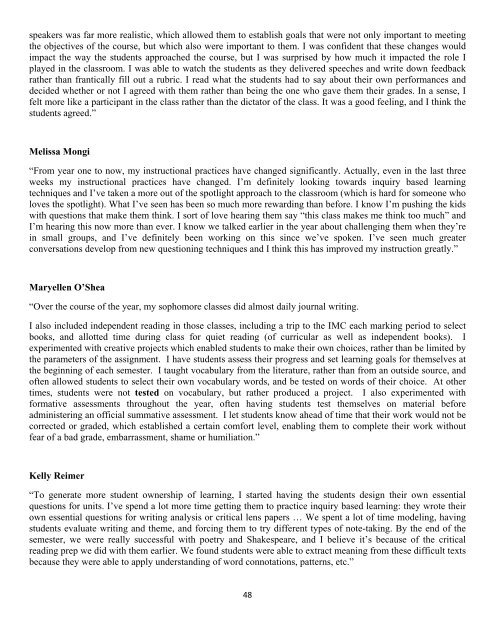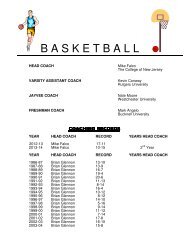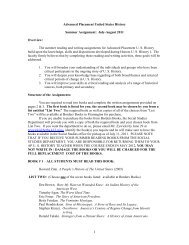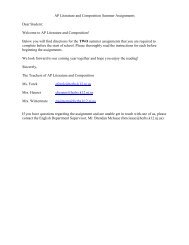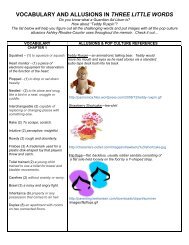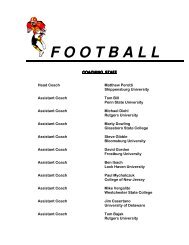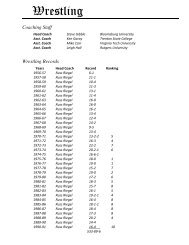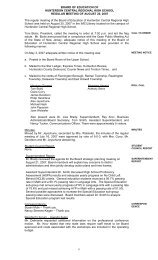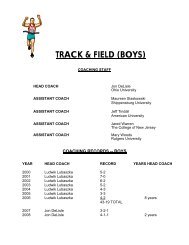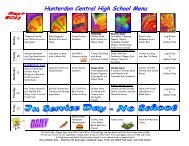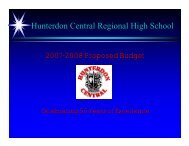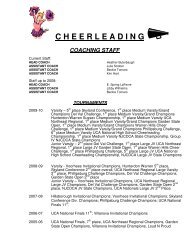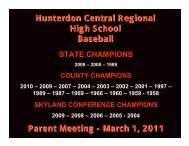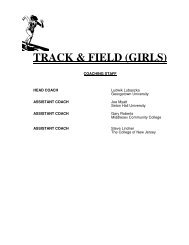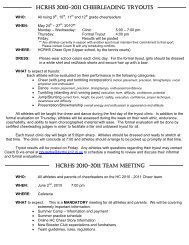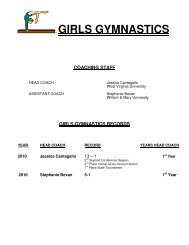HUNTERDON CENTRAL REGIONAL HIGH SCHOOL DISTRICT
HUNTERDON CENTRAL REGIONAL HIGH SCHOOL DISTRICT
HUNTERDON CENTRAL REGIONAL HIGH SCHOOL DISTRICT
You also want an ePaper? Increase the reach of your titles
YUMPU automatically turns print PDFs into web optimized ePapers that Google loves.
speakers was far more realistic, which allowed them to establish goals that were not only important to meeting<br />
the objectives of the course, but which also were important to them. I was confident that these changes would<br />
impact the way the students approached the course, but I was surprised by how much it impacted the role I<br />
played in the classroom. I was able to watch the students as they delivered speeches and write down feedback<br />
rather than frantically fill out a rubric. I read what the students had to say about their own performances and<br />
decided whether or not I agreed with them rather than being the one who gave them their grades. In a sense, I<br />
felt more like a participant in the class rather than the dictator of the class. It was a good feeling, and I think the<br />
students agreed.”<br />
Melissa Mongi<br />
“From year one to now, my instructional practices have changed significantly. Actually, even in the last three<br />
weeks my instructional practices have changed. I’m definitely looking towards inquiry based learning<br />
techniques and I’ve taken a more out of the spotlight approach to the classroom (which is hard for someone who<br />
loves the spotlight). What I’ve seen has been so much more rewarding than before. I know I’m pushing the kids<br />
with questions that make them think. I sort of love hearing them say “this class makes me think too much” and<br />
I’m hearing this now more than ever. I know we talked earlier in the year about challenging them when they’re<br />
in small groups, and I’ve definitely been working on this since we’ve spoken. I’ve seen much greater<br />
conversations develop from new questioning techniques and I think this has improved my instruction greatly.”<br />
Maryellen O’Shea<br />
“Over the course of the year, my sophomore classes did almost daily journal writing.<br />
I also included independent reading in those classes, including a trip to the IMC each marking period to select<br />
books, and allotted time during class for quiet reading (of curricular as well as independent books). I<br />
experimented with creative projects which enabled students to make their own choices, rather than be limited by<br />
the parameters of the assignment. I have students assess their progress and set learning goals for themselves at<br />
the beginning of each semester. I taught vocabulary from the literature, rather than from an outside source, and<br />
often allowed students to select their own vocabulary words, and be tested on words of their choice. At other<br />
times, students were not tested on vocabulary, but rather produced a project. I also experimented with<br />
formative assessments throughout the year, often having students test themselves on material before<br />
administering an official summative assessment. I let students know ahead of time that their work would not be<br />
corrected or graded, which established a certain comfort level, enabling them to complete their work without<br />
fear of a bad grade, embarrassment, shame or humiliation.”<br />
Kelly Reimer<br />
“To generate more student ownership of learning, I started having the students design their own essential<br />
questions for units. I’ve spend a lot more time getting them to practice inquiry based learning: they wrote their<br />
own essential questions for writing analysis or critical lens papers … We spent a lot of time modeling, having<br />
students evaluate writing and theme, and forcing them to try different types of note-taking. By the end of the<br />
semester, we were really successful with poetry and Shakespeare, and I believe it’s because of the critical<br />
reading prep we did with them earlier. We found students were able to extract meaning from these difficult texts<br />
because they were able to apply understanding of word connotations, patterns, etc.”<br />
48


